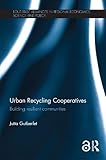Urban Recycling Cooperatives : Building Resilient Communities.
Material type: TextSeries: Routledge Advances in Regional Economics, Science and Policy SeriesPublisher: Milton : Taylor & Francis Group, 2016Copyright date: �2016Edition: 1st edDescription: 1 online resource (226 pages)Content type: text Media type: computer Carrier type: online resourceISBN: 9781317415404Genre/Form: Electronic books.Additional physical formats: Print version:: Urban Recycling CooperativesDDC classification: 334.6813637282 LOC classification: HD4482.G87 2016Online resources: Click to View
TextSeries: Routledge Advances in Regional Economics, Science and Policy SeriesPublisher: Milton : Taylor & Francis Group, 2016Copyright date: �2016Edition: 1st edDescription: 1 online resource (226 pages)Content type: text Media type: computer Carrier type: online resourceISBN: 9781317415404Genre/Form: Electronic books.Additional physical formats: Print version:: Urban Recycling CooperativesDDC classification: 334.6813637282 LOC classification: HD4482.G87 2016Online resources: Click to View Intro -- Cover Page -- Half Title page -- Series page -- Title Page -- Copyright Page -- Dedication -- Contents -- Photographs -- Figures -- Tables -- Box -- Acknowledgements -- 1 Waste governance An introduction -- 1.1 Introduction: why research waste? -- 1.1.1 Ecological paradigm -- 1.1.2 Social paradigm -- 1.1.3 Economic paradigm -- 1.2 Key terms and key perspectives discussed -- 1.3 Introduction to the content of the book -- Notes -- 2 Situated theoretical framework for waste governance -- 2.1 Introduction to the theoretical background -- 2.2 The overarching frame of situated Urban Political Ecology -- 2.2.1 Critical theory -- 2.2.2 Political ecology -- 2.2.3 Urban Political Ecology -- 2.2.4 Urban metabolism -- 2.2.5 Cyborg -- 2.2.6 Power structures and relations -- 2.2.7 Situating urban political ecology -- 2.3 Participatory methodology -- 2.4 Conclusion: situating waste into an everyday social and political context -- 3 Participatory community-based research Theory and praxis -- 3.1 Introduction: communities increasing research visibility -- 3.2 Participatory community-university research -- 3.2.1 Participatory CBR and power structures -- 3.2.2 Problem-based learning -- 3.2.3 Participation -- 3.3 Aims, objectives and structure of the Participatory Sustainable Waste Management project -- 3.4 Sharing a story: recyclers taking ownership of the project -- 3.5 Some of the achievements of the PSWM project -- 3.6 Final considerations -- 4 From hazardous 'informal' recycling to decent working conditions -- 4.1 Introduction to the concept of 'informal' recycling -- 4.2 'Informal' recycling inscribed within the informal economy -- 4.2.1 Informal economy concept -- 4.2.2 From 'informal' to decent work -- 4.3 Scope and character of 'informal' recycling -- 4.3.1 Informal recyclers' livelihoods -- 4.3.2 The work of informal recyclers.
4.3.3 The collection of recyclable material from household waste -- 4.4 Ways of organizing informal recycling -- 4.4.1 Recycling cooperatives -- 4.4.2 Cooperatives and women -- 4.4.3 Organizing recyclers internationally -- 4.4.4 Social movements of informal recyclers and waste pickers -- 4.5 Stepping up towards Social and Solidarity Economy -- 4.6 Translating actions into public policies -- 4.6.1 Supportive legislation in Brazil -- 4.7 Final considerations -- Note -- 5 The social aspects of waste -- 5.1 Introduction to the global social challenges of waste pickers -- 5.2 Social stigma against informal recyclers -- 5.3 Cooperatives as life-transforming spaces -- 5.3.1 Empowerment within the cooperative -- 5.3.2 Empowerment for political action -- 5.3.3 Empowerment and participation -- 5.3.4 Gender-specific empowerment -- 5.4 Other social contributions of inclusive solid waste management -- 5.4.1 Generating employment -- 5.4.2 Socio-environmental stewards -- 5.5 Final considerations -- Note -- 6 Health and risk factors for waste pickers -- 6.1 Introduction -- 6.2 Livelihood conditions and health of informal recyclers -- 6.2.1 Working on the dumpsite -- 6.3 Social stigma and emotional wellbeing of the recycler -- 6.4 Physical health impacts -- 6.4.1 Chemical and biological pollutants and pathogens -- 6.4.2 Ergonometric problems and risks of accidents -- 6.5 Health implications from separating e-waste -- 6.6 Cooperative recycling and health -- 6.7 Final considerations -- 7 Recycling the organic fraction of household waste -- 7.1 Introduction -- 7.2 Sustainability - resilience framework -- 7.3 Resource potential: organic waste -- 7.3.1 Composting organic MSW -- 7.3.2 Anaerobic digestion of organic MSW -- 7.4 Experiences with organic waste recovery -- 7.4.1 Composting in Accra, Ghana -- 7.4.2 Food production in Dar-es-Salam, Tanzania.
7.4.3 Organic household waste collection for composting and food production in community gardens -- 7.4.4 Anaerobic digestion of organic waste -- 7.5 Final considerations: assets and barriers for the implementation of organic waste recovery -- 8 Contributions to climate change mitigation Environmental benefits from the work of waste pickers -- 8.1 Introduction: what's the link between consumption and climate change? -- 8.2 Ecological Economy a framework proposing radical societal change -- 8.2.1 Cultural and ethical change -- 8.2.2 Urban metabolism -- 8.3 The challenge: environmental impacts from solid waste -- 8.3.1 Solid waste generation -- 8.3.2 Waste composition and waste management -- 8.3.3 Environmental impacts from waste management -- 8.4 Benefits from 'informal' waste recovery -- 8.5 Case study assessing the environmental contributions from cooperative recycling -- 8.6 Final considerations -- 9 Different ways of managing waste From neoliberal to cooperative approaches -- 9.1 Introduction: the politics of infrastructure and services in solid waste management -- 9.2 Lack of public services in waste collection and final destination -- 9.3 Trends in waste management under neoliberal politics -- 9.3.1 Privatization of public services -- 9.3.2 Privatization in waste management -- 9.3.3 Introduction of high-tech approaches to waste management -- 9.3.4 Casualization of labour -- 9.3.5 Waste-to-energy -- 9.4 Contracting recycling cooperatives and associations in waste management -- 9.5 Concluding remarks -- 10 Final outlook A world without waste -- 10.1 Introduction: from waste as a problem to waste as a solution -- 10.2 A new waste regime: change in culture for zero waste -- 10.3 Recycling cooperatives and resource recovery -- 10.4 A future without waste? -- References -- Index.
Description based on publisher supplied metadata and other sources.
Electronic reproduction. Ann Arbor, Michigan : ProQuest Ebook Central, 2023. Available via World Wide Web. Access may be limited to ProQuest Ebook Central affiliated libraries.


There are no comments on this title.